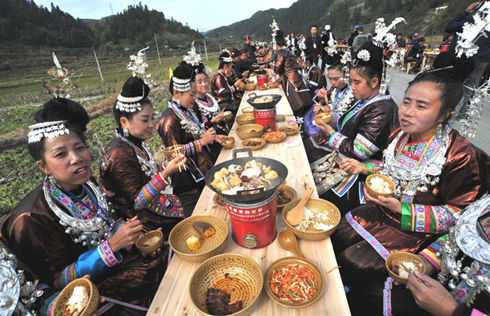China keen to be part of African dream
|
 The convention center of the African Union in Addis Ababa, Ethiopia. The center is one of the key projects that China has helped to build in Africa. DING HAITAO / XINHUA
|
When Chinese workers built the Tazara Railway connecting Tanzania and Zambia 40 years ago, people in those countries gained greater freedom of movement, and the link helped establish a larger market that provided a bulwark against the apartheid states of South Africa and Namibia.
As part of the January celebrations to mark the 50th anniversary of the African Union, the 20th summit of government leaders was given the theme "Pan-Africanism and Africa Renaissance".
Nkosazana Dlamini-Zuma, chairwoman of the AU Commission, told delegates that the unity of purpose, sacrifice and solidarity shown by the African nations was a key factor in the decolonization of the continent and the dismantling of apartheid.
Zuma said the motive for reviewing the same topic after half a century was that "the spirit of pan-Africanism and the ideals of the African Renaissance brought us to where we are today and must propel us toward an integrated, people-centered, prosperous Africa at peace with itself".
Facing future challenges
Africa will face many challenges in the future and by contributing investment and the means to improve the infrastructure, China will play a crucial role as a firm supporter of the continent's renaissance and unification, according to Zhai Jun, deputy minister of the Ministry of Foreign Affairs of China.
"We must support, strongly support, African integration and unification, because only unification will allow Africa to become stronger," he said.
Africa has made great progress in recent years, but the reality is that conflicts in some areas are running parallel to economic improvements, said Zhai.
"Economic affairs have been the focal point of Sino-African cooperation, but we are further strengthening our ties with African countries in building peace and security," he said.
"As the world's largest developing country and a responsible power, we must play a vital role in ensuring peace and security in Africa."
Ngari Gituku, editor of Diplomat East Africa, said, there is a need to promote strong pro-African sentiment to avoid a situation where Africans will be reduced to bystander status for a second time by new colonial manoeuvres and tactics, especially those of her former colonizers.
If China is to contribute to the development of the continent and also protect its own long-term interests in Africa, it will have a special role to play in accelerating the process.
"African countries will be unable to gain a voice in international politics, unless they are unified," said Li Beifen, China's former ambassador to Benin and Tunisia, who added that Africa's unification and development are in line with Chinese interests, because both sides speak for developing countries.
"We have similar experiences on many issues, such as colonial history, the course of development and future challenges, including climate change. Thus, a more integrated Africa, devoid of foreign intervention, will help developing countries to be heard on the international stage," she said.





























